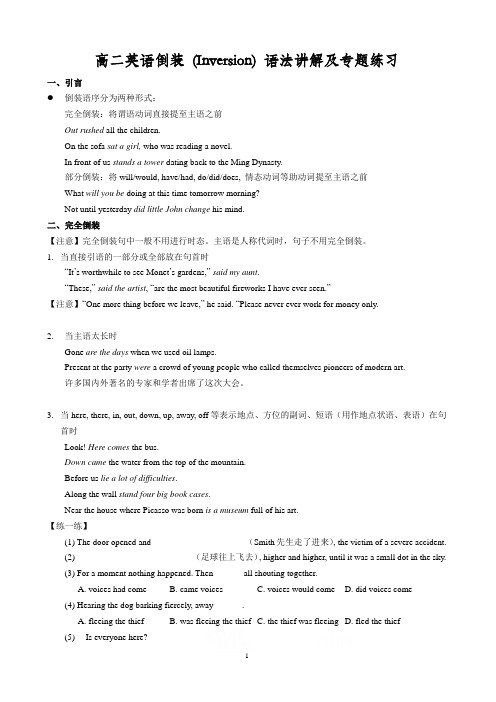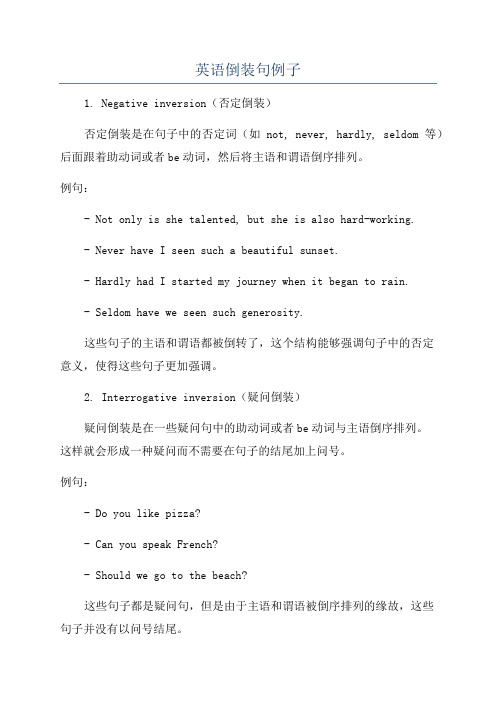英语语法倒装inversion
高二英语倒装 (Inversion) 语法讲解及专题练习

高二英语倒装(Inversion) 语法讲解及专题练习一、引言倒装语序分为两种形式:完全倒装:将谓语动词直接提至主语之前Out rushed all the children.On the sofa sat a girl, who was reading a novel.In front of us stands a tower dating back to the Ming Dynasty.部分倒装:将will/would, have/had, do/did/does, 情态动词等助动词提至主语之前What will you be doing at this time tomorrow morning?Not until yesterday did little John change his mind.二、完全倒装【注意】完全倒装句中一般不用进行时态。
主语是人称代词时,句子不用完全倒装。
1. 当直接引语的一部分或全部放在句首时“It’s worthwhile to see Monet’s gardens,”said my aunt.“These,”said the artist, “are the most beautiful fireworks I have ever seen.”【注意】“One more thing before we leave,” he said. “Please never ever work for money only.2. 当主语太长时Gone are the days when we used oil lamps.Present at the party were a crowd of young people who called themselves pioneers of modern art.许多国内外著名的专家和学者出席了这次大会。
____________________________________________3. 当here, there, in, out, down, up, away, off等表示地点、方位的副词、短语(用作地点状语、表语)在句首时Look! Here comes the bus.Down came the water from the top of the mountain.Before us lie a lot of difficulties.Along the wall stand four big book cases.Near the house where Picasso was born is a museum full of his art.【练一练】(1) The door opened and ______________________(Smith先生走了进来), the victim of a severe accident.(2) __________________________ (足球往上飞去), higher and higher, until it was a small dot in the sky.(3) For a moment nothing happened. Then ______ all shouting together.A. voices had comeB. came voicesC. voices would comeD. did voices come(4) Hearing the dog barking fiercely, away ______.A. fleeing the thiefB. was fleeing the thiefC. the thief was fleeingD. fled the thief(5) ---Is everyone here?---Not yet. Look, there ______ the rest of our guests!A. comeB. comesC. is comingD. are coming(6) From the window ______--- there must be a concert in the hall.A. sound of music cameB. came sound of musicC. did sound of music comeD. did come sound of music(7) There on the ground ______ a poor girl of sixteen years old.A. did layB. did lieC. laidD. lay(8) In the middle of the square ______ with a statue of a hero on top of it.A. stands a stoneB. does a stone standC. a stone standsD. a stone does stand(9) Between the two rows of trees ______ the teaching building, which ______ built in the 1990s.A. stands; wasB. stand; wasC. stands; wereD. stand; were(10) At the meeting place of the Yangtze River and the Jialing River ______, one of the ten largest cities inChina.A. lies ChongqingB. Chongqing liesC. does lie ChongqingD. does Chongqing lie(11)______ and the mouse was caught.A. Up the cat jumpedB. The cat up jumpedC. Up jumped the catD. Jumped up the cat4、such pron.“这样的人(或事物);上述的人(或事物)”Accountants were boring. Such was her opinion before meeting Ian.做会计的个个乏味。
倒装(Inversion)

倒装(Inversion)一概述在英语中,主语和谓语的语序通常是主语在前,谓语在后,但有时谓语的全部或一部分却提到主语的前面,这种语序叫做“倒装”。
倒装分为“全部倒装”和“部分倒装”。
在全部倒装的句子中,整个谓语都放在主语的前面;在部分倒装的句子中,只是谓语中的一部分(如助动词、情态动词或系动词be等)放在主语前面,其余部分仍放在主语后面。
一)完全倒装完全倒装即把整个谓语放到主语之前(是整个谓语动词,而非助动词)。
例如:In came the teacher and the class began . (老师走了进来,然后开始上课。
)1.在there be 结构中There is a rumour that a large company wants to build a factory in your town.There will be a basketball match this afternoon.2、在以there或here开头的句子中,谓语动词为be, come, go, run, walk, rush, fall以示强调。
例如:Here is China’s largest tropical forest.Here are some picture-books.There comes the bus!There goes the bell!Here comes Mary!注:如果主语为人称代词,仍用自然语序,例如:Here you are. / Here we are. / Here it isThere he comes! Here she comes!3、在以out, in ,up, down, away等副词开头的句子中,谓语动词为be, come, go, run, walk, rush, fall等,以示强调。
例如Up flew the red balloon.Out rushed a policeman from among the crowd.注:如果主语为人称代词,仍用自然语序,例如Away they went./ Down it flew. / Up it went.4、由then 或now引起,谓语动词为come, follow, begin, end, be等的句子,Then came a new difficulty.Then followed eight years of the Anti-Japanese War.Now comes your turn.5、直接引语的一部分或全部放在句首时,有时也用倒装。
Inversion倒装

Inversion倒装按“主语+谓语”这种顺序排列的句子是陈述语序,如果将某个句子成分移至句首而引起主语和谓语顺序的颠倒,使句子的排列顺序变为“谓语(或谓语的一部分)+主语”就是倒装句。
倒装有两种情况:完全倒装和部分倒装。
一、完全倒装Full Inversion (主语和谓语完全倒置)1.在there, here引导的表示存在的句型中,谓语是be,exist,stand,lie ,live等表示状态的不及物动词。
eg. There was a mountain long long ago. (从前有座山)There stood a temple at the top of the mountain. (山上有座庙。
)There loved three monks in the temple. (庙里有三个和尚。
)2.句子谓语是go,come,run等表示位置移动的动词和be动词,句中又有表示方位的副词(here,there,off,up,down,out,in,away等),当其主语为名词时,为了强调该副词,可将其放于句首,后面用陈述句语序,即主谓不倒装。
eg. There goes the bell ! 铃响了!Here comes your husband ! 你丈夫来了!Down come the rain ! 下雨了。
Here comes the train to Beijing. 去北京的火车来了。
Off goes the woman ! 那个女人走了。
Away went the boy to the school. 那男孩子到学校里去了!Here she comes. 她来了。
Here you are . 给你。
3.副词now,then,thus引导的句子里,谓语是come,follow,begin,and,be等。
eg. Now comes your turn !Then followed a shot of gun !Thus ended the meeting !4.为了强调句中的状语或表语,为了保持句子平衡或上下文衔接紧密,在叙述性和描绘性的书面语中,句中主语和谓语完全倒装,可将状语或表语置于句首。
倒装(Inversion)

用于某些祝愿的句子。 1) May you succeed! 2) Long live China!
注意: 代词作主语时, 主谓语序不变。
Here comes he. × Here he comes. Away went they. × Away they went.
The boy /He rushed out Out rushed the boy. Out he rushed
考点二:为了句子的平衡或 强调表语,将表语置于句首 时,句子用完全倒装。
在 so/such …that 的结构中,若so/such
置于句首,则句子部分倒装。
1) It is such an interesting book that John
has read it twice. Such an interesting book is it that John has read it twice. 2) It is so interesting a book that John has read it twice.
考点七 用于句首省略了if的虚拟条件句 子中并句中含有should, had或were. ① Should it rain, the crops would grow better. If it should rain, the crops would … ② Were there no steel, there would be no modern industry. It there were no steel, there would be … ③ Had it not been for the captain, the ship would have sunk. If had not been for the captain, the ship …
英语倒装句例子

英语倒装句例子1. Negative inversion(否定倒装)否定倒装是在句子中的否定词(如not, never, hardly, seldom等)后面跟着助动词或者be动词,然后将主语和谓语倒序排列。
例句:- Not only is she talented, but she is also hard-working.- Never have I seen such a beautiful sunset.- Hardly had I started my journey when it began to rain.- Seldom have we seen such generosity.这些句子的主语和谓语都被倒转了,这个结构能够强调句子中的否定意义,使得这些句子更加强调。
2. Interrogative inversion(疑问倒装)疑问倒装是在一些疑问句中的助动词或者be动词与主语倒序排列。
这样就会形成一种疑问而不需要在句子的结尾加上问号。
例句:- Do you like pizza?- Can you speak French?- Should we go to the beach?这些句子都是疑问句,但是由于主语和谓语被倒序排列的缘故,这些句子并没有以问号结尾。
3. Adverbial inversion(副词倒装)副词倒装常常出现在一些表达地点或时间的副词(如here, there, now, then, on the front)在句首的情况下。
例句:- There went my chance.- Then came the storm.- On the front are the main headlines.这些句子中的副词被放在句子的最前面,并且主语和谓语被倒序排列了。
4. Emphatic inversion(强调倒装)强调倒装通常强调句子中的某个部分,被强调的部分通常在句首。
英语 倒装(全部倒装和部分倒装)

部分倒装句的具体用法
3. so…that 结构中的 so 置于句首时,需要部分倒装。 例如:So absurd did he look that everyone stared at him. 句首是 many a time, to such a degree / extent, to such a extremes, to such a lengths, to such a point, with every justification, with good reason 等状语时,句 子需要部分倒装。 例如:To such a degree was he excited that he couldn’t go to sleep that night.
部分倒装句的具体用法
2. 句首是 only 引导的状语时, 需要部分倒装。 例如:Only in this way can we solve the problem. 常用短语还有:only by chance, only then, only with difficulty, only on a rare occasion 等等。
部分倒装句的具体用法
6.在比较和方式状语从句中,如果主语不是人称代词,
常在主语前加助动词 do / did 代替前面已出现过的动词。 例如:I spend more than do my friends. She traveled a great deal as did most of her friends.
全部倒装句的具体用法
5.用于表示祝愿的句型。 例如:May you live a long and happy life ! Long live the People’s Republic of China !
Inversion倒装

Inversion倒装 倒装
2. 以否定词开头作部分倒装 , 如 Not only…but 以否定词开头作部分倒装, also, Hardly/Scarcely…when, No sooner… than等. 等 Not only did he refuse the gift, he also severely criticized the sender. Hardly had she gone out when a student came to visit her. No sooner had she gone out than a student came to visit her. 注意:只有当Not only… but also连接两个分句时, 连接两个分句时, 注意:只有当 连接两个分句时 才在第一个分句用倒装结构. 才在第一个分句用倒装结构 . 如果置于句首的 Not only… but also仅连接两个并列词语,不 仅连接两个并列词语, 仅连接两个并列词语 可用倒装结构. 可用倒装结构. Not only you but also I am fond of music.
Inversion倒装 倒装
3. so, neither, nor作部分倒装 , 表示 " 也 " , 作部分倒装, 作部分倒装 表示" 也不" "也不". Tom can speak French. So can Jack. If you won't go, neither will I. 注意: 注意 : 当 so引出的句子用以对上文内容加以证实 引出的句子用以对上文内容加以证实 或肯定时 , 不可用倒装结构 . 意为 " 的确如 此". Tom asked me to go to play football and so I did. ---It's raining hard. ---So it is.
Chapter 24 Inversion(倒装)

注:但是当连接主语时不倒装
Neither he nor I has kept the secret.
Partial inversion
9. so…that/ such…that中 so+ adj./adv或 such…提前到句首时,此部分用倒装语序。如: So loudly did he speak that even people in the next room could hear him. So absurd did he look that everyone stared at him. In such a hurry did he leave that he forget to lock the door. Such a good voice did she have that she soon became a famous singer.
Full inversion
8. 在There be (exist, happen, live,
appear, lie, occur, seem, remain, stand等)句型中,构成完全倒装句。如:
There exist so many mistakes. There occurred a terrible accident at that time.
you with a cheque.
Partial inversion
3. 带有“not”的短语位于句首:not until, not a bit,
not once等 。如:
Not a bit am I afraid.
Not once did he talk to me.
- 1、下载文档前请自行甄别文档内容的完整性,平台不提供额外的编辑、内容补充、找答案等附加服务。
- 2、"仅部分预览"的文档,不可在线预览部分如存在完整性等问题,可反馈申请退款(可完整预览的文档不适用该条件!)。
- 3、如文档侵犯您的权益,请联系客服反馈,我们会尽快为您处理(人工客服工作时间:9:00-18:30)。
A question is a common case of inversion Has he packed hme at the beginning of a sentence.
Seldom Rarely Little Barely Nowhere (else) Never (before) Not (even)once On no account Only be
With SO (+) / NEITHER / NOR (-) to express agreement
“I love turkey” - “ so do I” “I have been to Brazil” - “so have I” “I sent her a message” - “So did I”
only in this way Hardly (ever) … when No sooner … than Not only … but (also) In no way In / under no circumstances Not since, etc
Never have I eaten such an exotic dish. Not only did the restaurant owner serve rotten tomatoes but were impolite to the costumers.
Seldom do I go out since my children were born. (but) I seldom go out since my children were born.
With the expressions ONLY AFTER, ONLY BY, ONLY IF, ONLY WHEN, NOT UNTIL / TILL, the inversion is in the main clause. Only if you have a nourishing diet will you have a healthy life. Only after trying the recipe several times was she able to get the whipped cream
Were I you, I would tell the truth (If I were you) Had I been told, I would have asked before. (If I had been told)
After verbs of movement or adverbial expressions of place when they come at the beginning of a sentence. Outside the house was a big pine tree. On the chair lay a cat Here comes the bus There she goes (not there goes she because she is a pronoun not a noun.)
“I can’t stand spiders” “ I won’t do that” -
“Neither can I” “Nor will I”
“I can swim very well” -
“I can’t ” “I did”
“ I didn’t do the homework” -
